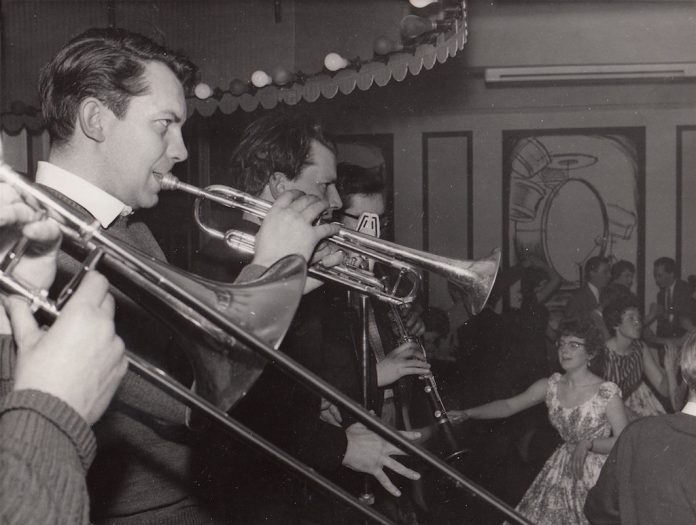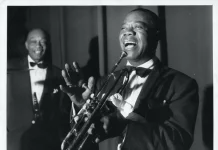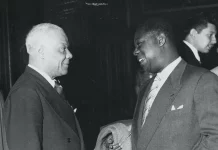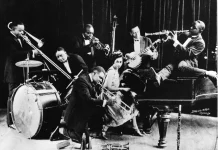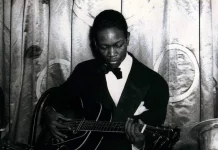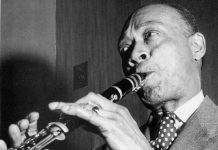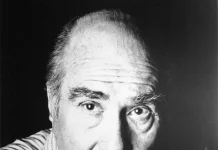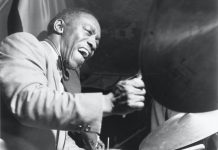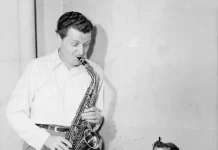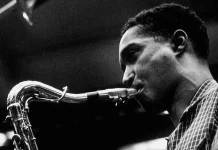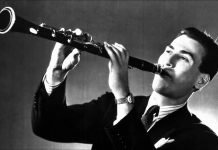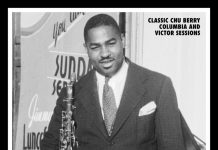Whatever has happened to Marty Grosz? Has he retired? A jazz musician in total command of his idiom, he is blessed with a unique sense of humour.
“My girl friend was very pleased with my performance, so she gave me a signed omelette. That wasn’t all she gave me. I’m still seeing the doctor”.
I’ve got half a dozen of his diverting CDs which I still play regularly. One, given to me when I used to write the jazz obituaries in The Independent, is inscribed “I’ve read you in Jazz Journal, but keep me out of The Independent please”.
Keith Christie became the most effective trombone soloist in British jazz during the 60s. By then he was in demand for every modern jazz scene, after having come up in the previous decade as the rock-solid epitome of traditional jazz trombone. (This was before the accomplished Chris Barber emerged to head the otherwise whimpering trad boom.) Trad happened alongside all this and was of no concern to players like Keith. His pithy and powerful solos are to be found everywhere on tapes by Tubby Hayes, Stan Tracy, Lamb-Premru and a multitude of other groups. Unfortunately Keith, tremendously popular with other musicians, didn’t take proper care of himself and jazz in this country was seriously depleted by his death on 16 December 1980 when he was 59.
Keith had been one of the standard setters in the Humphrey Lyttelton band that dominated the local jazz of the 50s.
Humph easily led the way in mainstream and traditional, while Ronnie Scott reluctantly became the big name in modern jazz. A long way behind Humph was Freddie Randall’s band, a haven for perhaps somewhat cynical Eddie Condon admirers. And third? Condon himself put his finger on it.
“Mick Mulligan”, wrote Condon, “is known as The Eddie Condon of England. Someday I hope he’ll beat that rap”.
Mulligan, onetime trumpeter and bandleader, sometime bon viveur and grocer, was one of the most attractive characters on the local scene. He had a fey charm that disarmed landladies and publicans across the country but his irresistible smile held both mischief and danger for those who triggered it. Mick had a no-nonsense honesty that swiftly pricked cant or dissemblance amongst his fellow musicians and whilst he was prepared to forgive outrages against himself he often held grudges for life over insignificant matters. He had once provided a container of cider for pianist Dill Jones and his friends that Jones had undertaken to pay for. Jones never did and whenever they met across the years Mulligan would ask “Enjoy that cider, did you?”
His happiest years were in the 50s when he led his own band and became friends with Condon, Louis Armstrong and Wild Bill Davison, the men who had been his idols since the 40s.
Although he moved in the world of jazz professionals, Mick always gave precedence to his personal enjoyment of life. His and George Melly’s Rabelaisian manner of life came to be referred to as raving, although this was a description for the press, of their ceaseless roistering, and was not used by the participants.
In their day the two men left a trail of scorched earth through the pubs and virgins of Britain and, as their admiring colleagues would say, neither has anything to come back for
It was in Mick Mulligan’s Magnolia Jazz Band that the young and equally volatile Melly came to fame. Comrades who burnt the candle at both ends and in the middle they were in some ways opposites; despite his outrageous behaviour Mick was essentially shy, carefully sidestepping Melly’s exotic and profligate flamboyance. In their day the two men left a trail of scorched earth through the pubs and virgins of Britain and, as their admiring colleagues would say, neither has anything to come back for.
Educated at Merchant Taylors’ School he was subsequently an officer in the Rifle Brigade. Shortly after his discharge he went to work in the family wine-importing business. To accomplish the seduction of its leading lady, Mulligan used the company’s money to finance a show that ran for about three nights in London. He later referred to the event as “The most expensive screw I ever had”.
Soon his cousins took over the business and became alarmed by the fact that when he later formed a band, he used to bring his musicians to the company’s regular wine tastings. Mick was eventually paid the opposite of a retainer – eight pounds a week to stay away.
Always keen on jazz, he decided in 1948 that he would form a band. He held an audition for musicians. Melly, who had then never met the trumpeter, turned up uninvited and Mulligan was too shy to tell him that he didn’t intend to have a vocalist.
“Mick peered at me short-sightedly”, wrote Melly later. “He looked like an exhausted faun. I had a bad dose of impetigo contracted by shaving with a very old blade I had found stuck to its own rust on the bathroom mantelpiece, and half my face was unshaven and smeared with bright blue ointment.
‘What a lecherous looking bastard’, Mulligan said, and offered me a cigarette”.
The two became inseparable for many years and friends for life. Melly recalled their exploits together in Owning Up (Weidenfeld & Nicolson, 1965) a dazzling and hilarious account so well written that it has not dated one bit.
“George owned up about everyone but himself”, Mulligan sniffed.
The band pre-dated the trad boom and was second only to but a long way behind the Humphrey Lyttelton Band. It was at first based roughly on the music of Louis Armstrong with Melly singing Bessie Smith songs. The fact that it was pretty awful and driven only by enthusiasm was because of the ineptitude of the musicians and Mulligan’s hatred of any rehearsal. Its style was persistently inconsistent due to the fact that it changed when new musicians joined so that by the time that it included such comparative sophisticates as Roy Crimmins, Ian Christie and Archie Semple, the music was firmly in the Condon Chicago style.
When they first lived together Mick and Pam Walker had a flat underneath that of Sinclair Traill, the founder, in 1948, of this magazine. Mulligan had been aware for some time that Traill had been stealing his coal from their shared coal-shed, but was too shy to do anything about it. Eventually he steeled himself to broach the matter and knocked on Traill’s door. Sinclair opened it, and vigorously stroking his moustache and, as was his wont, bulging his eyes, said “Ah, Mulligan! I wanted to see you. Have you been stealing my coal?”
Mick and Pam had four children and then finally decided to get married. “Why d’you want to do that after all this time?” asked one of Mick’s friends. “We thought it would make a nice day out for the kids”, answered Mulligan.
Success brought an abrasive routine of cross-country one-nighters and an unwavering series of disasters in pubs, halls and bed-and-breakfasts across the country. One of their more spectacular lodgings was at the home of Mrs Flanagan in Sheffield. The lady kept a display in the hall of postcards sent by satisfied guests. In the middle of them somebody has inveigled one bearing a portrait of the Queen and signed “Lovely digs, Mrs Flanagan. Liz and Phil”.
The band’s performances were invariably affected by drink and the attendant disasters were often enormous. On one occasion when playing a solo Mulligan was so drunk that his head was empty of ideas and his lips kept sliding from the trumpet’s mouthpiece. All he could do to get control was to blow hard and very loudly. The result was 32 bars of frightening cacophony. At its end he stepped back, sweating heavily.
“All the noise and vulgarity of Freddy Randall”, he said to clarinettist Ian Christie, “with none of the technique”.
It was in 1956 when, not long married, I lived in a flat in Colwyn Bay. Mulligan, Melly and the ex-Lancashire wicket keeper Frank Parr, who was their trombonist, stayed the night there when they played in nearby Rhyl.
We returned to the flat drunk in the small hours and I put the trio to sleep in the small living room. I joined my wife in bed and fell deeply asleep. I was awakened some time later when my head began moving involuntarily up and down. My wife sat up and pulled the cord over the bed that turned on the light. Mulligan the predator was revealed naked. He had come into the bedroom and had managed to round the cot by the bed that held my sleeping daughter. He had pulled up the sheets at the bottom of the bed and slid into it feet first. It was his foot under my chin that was moving my head up and down.
The band officially broke up in 1962 but came together for occasional dates. Mulligan continued to manage George Melly, who now worked as a solo artist, but before long Mulligan gave up full-time music and moved to Pagham in Sussex. He continued to play occasional jobs into the 70s.
In later years, when Mulligan had given up playing, his son Guy remarked that although he had often read about his father’s trumpet work, he had never heard him play. Mulligan began practising the instrument in secret and, when Guy got married in 1987, his father was able to sit in on trumpet with Campbell Burnap’s band, which was playing at the wedding. But it was the last time Mulligan played.
Calmed down and settled down, he changed in later years and became almost respectable. He and his second wife Tessa ran a successful off-licence and grocery in Pagham and he came to London to attend regular lunches held by the Codgers, a loose organisation of friends that included many of his ex-sidemen. He joined a syndicate racing horses.
Mick died at his home in Chichester on 20 December 2006. When my obituary for him was published in The Independent, much of which used the information above, I worried in case the members of his family would be upset. Don’t worry, I was told. They’re all just like him. They won’t give a damn.
They didn’t.

